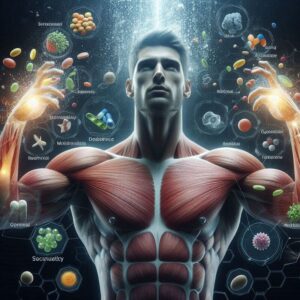The Best Diet for Optimal Health
The macronutrient ratios in your diet are more than numbers; they hold the secret to muscle recovery. Protein, carbs, and fats, the three main macronutrients, are more than energy sources. They serve as your body's structural components. They aid in several physiological processes and are essential for muscle repair. Each macronutrient has a distinct role in promoting muscle tissue repair and regeneration.
Protein is especially important for muscle recovery since it includes amino acids necessary for muscle repair and growth. Consuming adequate protein after exercise can increase muscle protein synthesis, which is forming new muscle proteins while decreasing muscle protein breakdown and breaking down current muscle proteins. This balance is critical for muscle recovery, which results in faster recovery and adaption. Carbohydrates are also crucial for muscle rehabilitation because they replenish glycogen stores depleted during exercise. Carbs can help with energy restoration and muscle regeneration when ingested after exercise. Finally, fats contribute to energy and hormone production, which affects muscle recovery.
The ideal macronutrient ratio for muscle repair is not a one-size-fits-all approach. It varies depending on individual characteristics such as body composition, exercise intensity, and training goals. However, eating protein and carbohydrates between 30 minutes to 2 hours of exercise is a general rule for improving muscle recovery. This is the optimal time to fuel your recuperation because your body is most sensitive to nutrition during this period.

Protein Sources for Muscle Recovery
Understanding that protein is not simply a dietary component but also an important role in muscle rehabilitation is critical. It contains essential amino acids for muscle repair and development. Eating protein-rich foods can help with muscle restoration. Animal sources such as eggs, dairy products, lean meats, fish, and poultry provide all the amino acids and high-quality protein required. These sources are especially advantageous for muscle regeneration because of their diverse amino acid profile.
There are numerous possibilities for people following a plant-based diet or seeking alternate protein sources. For example, lentils, chickpeas, and black beans are delicious, high-protein foods that can help with muscle recovery. And don't forget the versatility of tofu, tempeh, edamame, and other soy-based products, which are complete protein sources that can be safely included in a well-balanced diet to aid muscle recovery.
Protein supplements such as whey, casein, or plant-based powders can be useful when increasing protein consumption for muscle regeneration. These supplements help you obtain adequate protein after working out; you can mix them into your favourite smoothie, drink, or meal.
Carbohydrates for Muscle Recovery
Carbohydrates aid muscular recovery by replenishing glycogen stores that are depleted during exertion. Consuming carbohydrates within the first half-hour to an hour after exercise will assist restore energy stores and accelerate muscle regeneration. When you exercise hard, your muscles rely on glycogen for energy. The body is most efficient at storing glucose soon following exercise. The timing of carbohydrate intake can affect muscle glycogen synthesis and overall recovery.
Legumes, other high-sugar and starch foods, and fruits and vegetables are good options for muscle rehabilitation and have numerous health benefits. Their high fibre content and nutrient density give steady energy and the nutrients required for overall health and recovery. By consuming these complex carbs, you might feel more informed about your dietary choices and motivated to provide your body with the optimum nutrients.
Post-exercise nutrition is a critical factor in muscle recovery. Consuming a combination of carbs and protein can significantly boost muscle glycogen resynthesis and promote muscular repair. This powerful duo also stimulates insulin release, easing the process of transporting glucose and amino acids into muscle cells to aid recovery and repair.

Fats for Muscle Recovery
Muscle repair typically involves protein and carbohydrates, but dietary lipids are essential for general recovery and function. Fats are required for hormone production, specifically testosterone, for muscle growth and repair. Omega-3 fatty acids in foods such as walnuts, flaxseeds, and fatty fish have anti-inflammatory properties that can help reduce exercise-induced inflammation and speed up muscle recovery. These fatty acids also help build cell membranes necessary for muscle repair and growth.
Nuts, seeds, avocados, olive oil, and fatty fish are all high in essential fatty acids, which can benefit overall health and muscle regeneration. The beauty is that these fats can be employed in post-exercise meals or snacks to provide energy and aid in numerous physiological processes associated with recuperation. So don't be frightened to try new things. Your muscles will thank you for it!
While lipids are an essential part of a well-balanced diet for muscle regeneration, it is critical to remember the principle of moderation. Excessive consumption of unhealthy fats, such as trans and saturated fats, is not recommended. These fats can act against you, increasing inflammation and impeding overall healing and performance. So, it's all about striking the appropriate balance.
Hydration and Muscle Recovery
One of the most overlooked parts of muscle rehabilitation is the importance of staying hydrated. When we exercise, our bodies sweat, which causes fluid loss. If these fluids are not supplied, dehydration may occur. This has a significant impact on your performance and muscle recovery time. Dehydration impairs the transport of nutrients to muscles, increases the risk of cramping, and can potentially cause muscle damage.
Proper hydration supports not only muscle recovery but also overall health and well-being. It promotes the transport of nutrients to muscles, regulates body temperature, and eliminates waste. Ensuring appropriate fluid intake before, during, and after exercise is crucial for staying hydrated and encouraging muscle recovery. Although water is the most effective way to stay hydrated, electrolyte-rich liquids like sports drinks or coconut water can also help replenish the electrolytes your body loses when you exercise vigorously.
Awareness of your body's signals is essential for maintaining optimum hydration and maximising muscle recovery. Monitoring urine colour, body weight fluctuations, and thirst sensations can provide helpful information about your hydration status. This self-monitoring can help you maintain an optimal hydration intake, resulting in maximal muscle repair. Eat more water-rich foods like fruits and vegetables to help with general hydration and recovery.

Micronutrients for Muscle Recovery
Understanding the importance of micronutrients, including vitamins and minerals, in muscle recovery and overall health. These micronutrients are more than simply supplements; they are critical components that influence a variety of physiological processes, including exercise performance and recovery. For example, vitamin C's antioxidant qualities can reduce the inflammatory and oxidative stress caused by exercise, whereas vitamin D is essential for bone health and muscle function.
Minerals like iron, magnesium, and zinc aid energy production, oxygen supply, and muscular function during exercise. A varied diet rich in fruits, vegetables, whole grains, lean meats, and healthy fats is crucial for optimal muscle repair.
While athletes may benefit from supplementing with certain micronutrients to address deficiencies or higher demands from strenuous training, getting professional counsel is essential. Before beginning any supplement routine, contact a healthcare practitioner or certified dietitian to ensure safety and efficacy, making you feel secure and knowledgeable about your options.
Finally, food is essential for muscle repair after intensive physical activity. Consuming the right macronutrient balance, which includes protein, carbohydrates, and fats, as well as enough hydration and micronutrient intake, is essential for muscle regeneration and athletic performance. Paying attention to your meals and giving your body the necessary nutrients promotes faster healing, reduces the chance of injury, and improves your overall fitness level.
FAQs
What is muscle recovery?
Muscle recovery refers to how muscles repair and rebuild after physical stress, such as exercise or weightlifting. This process is essential for muscle growth and overall physical performance.
Why is diet important for muscle recovery?
Diet plays a crucial role in muscle recovery, providing the necessary nutrients for muscle repair and growth. Consuming the right balance of macronutrients (protein, carbohydrates, and fats) and micronutrients (vitamins and minerals) is essential for optimizing muscle recovery.
What is the best diet for muscle recovery?
The best diet for muscle recovery typically includes a combination of protein, carbohydrates, and healthy fats. High-quality protein sources, such as lean meats, fish, eggs, and dairy, can help support muscle repair and growth. Carbohydrates provide energy for workouts and aid in replenishing glycogen stores, while healthy fats support overall health and hormone production.
How much protein should I consume for muscle recovery?
The recommended protein intake for muscle recovery is typically around 1.2 to 2.2 grams of protein per kilogram of body weight per day, depending on individual factors such as activity level and muscle mass.
Are there specific foods that can aid in muscle recovery?
Foods rich in protein, such as chicken, turkey, salmon, eggs, Greek yoghurt, and tofu, are beneficial for muscle recovery. Additionally, incorporating complex carbohydrates like whole grains, fruits, and vegetables and healthy fats from sources like avocados, nuts, and olive oil can support muscle recovery and performance.
Should I consider supplements for muscle recovery?
While a well-balanced diet can provide the necessary nutrients for muscle recovery, some individuals may benefit from supplementing with protein powders, branched-chain amino acids (BCAAs), or creatine to support their muscle recovery and performance goals. It's essential to consult with a healthcare professional before adding supplements to your diet.
Brought To You By:
References
Nourish Your Hair: Protein Intake and Hair Health. https://www.theproteinfactory.pk/blog/protein-and-hair-health/
The Maximum Calorie Intake to Lose Weight | Woman – The Nest. https://woman.thenest.com/maximum-calorie-intake-lose-weight-17436.html
The Article: Optimal Diet for Muscle Recovery appeared first on Acupuncture Cottam.
The Article Optimal Diet for Muscle Recovery appeared first on MCR Therapies.
The Article Optimal Diet for Muscle Recovery Was Found On https://limitsofstrategy.com
The Article Optimal Diet for Muscle Recovery First Appeared ON
: https://ad4sc.com





Comments are closed